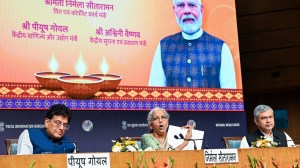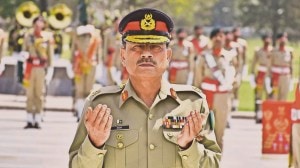Rajasthan govt makes it clear: Bhim Army’s Azad is not welcome
Since a March visit by Azad to family of a Dalit victim drew huge support, the Gehlot administration has kept him away.
 Bhim Army chief Chandrashekhar Azad during a press conference in New Delhi on Monday. (Express photo by Anil Sharma)
Bhim Army chief Chandrashekhar Azad during a press conference in New Delhi on Monday. (Express photo by Anil Sharma)
Bhim Army founder Chandrashekhar Azad is apparently not welcome in Congress-ruled Rajasthan. For the past few months, every time the Dalit leader, who founded the Azad Samaj Party to contest elections, has tried to enter the state following an incident involving the Scheduled Castes, he has been stopped.
Last week, Azad was stopped twice at Jodhpur airport, while on his way to Jalore to meet the family of the nine-year-old boy who died after allegedly being assaulted for drinking water from a pot meant for upper castes.
While the Bhim Army leader was stopped, among those who have met the family are Lok Janshakti Party leader Chirag Paswan, Rashtriya Loktantrik Party chief and MP Hanuman Beniwal with party MLAs, Aam Aadmi Party MLA Rohit Kumar Mehraulia, Congress state president Govind Singh Dotasra, and senior Congress leader Sachin Pilot.
The first instance when Azad was stopped was on April 3, when he and RLD national president Jayant Chaudhary were not allowed to proceed beyond Udaipur airport, while on way to Pali, to meet the family of Jitendra Meghwal, allegedly killed by upper caste men for sporting a moustache.
The RLD’s only MLA in Rajasthan, Subhash Garg, is a minister in the Ashok Gehlot government. Despite this, Chaudhary could not proceed, presumably because he was accompanied by Azad.
Officially, police cited the imposition of Section CrPC 144 in Pali.
Incidentally, days earlier, on March 22, when Azad and others had visited Meghwal’s family, he had drawn huge support, with people lining up to see his cavalcade.
Stopped in April, Azad challenged the Gehlot government saying: “Had as much police been deployed to end feudalism as much as to stop us at the Udaipur airport, not one Jitendra Meghwal would have been killed for having a moustache. No matter how much dictatorship you show, we are not going to move from here until our demands are met.”
As the number of Azad’s supporters grew outside the airport, police agreed to allow Meghwal’s family into the airport for him to meet them. After the meeting happened, Azad returned to Delhi.
Then, on the intervening night of July 1 and 2, Azad and 21 others were picked up by the Jaipur police from their hotel, hours before they were to join an on-going protest by Covid Health Assistants, who were hired at the height of the pandemic, demanding reinstatement of their jobs.
The Bhim Army claimed they had held talks with police about their plans, and hence the midnight arrests came as a shock.
Dalit activist Dharmendra Kumar had told The Indian Express then: “The Jaipur police was also told that if the government does not want the protest to be held now, it could be postponed. Alternatively, a memorandum could be submitted to a government official. However, police arrived around 12:30 am and picked up Azad and the others.”
They got bail only two days later.
The People’s Union for Civil Liberties had also questioned the action against the Bhim Army chief and supporters. “The use of CrPC Section 151 to arrest Azad makes a mockery of the freedom of speech and expression. It is worth repeating that police under the said Section have the power to arrest on ‘knowing of the design to commit any cognizable offence’,” it said, adding that police had no such evidence and the group was actually in talks with them.
In the latest incident, when Azad wanted to go to Jalore, the president of his party, R L Meena, said he was kept at the Jodhpur airport police station from around 2 pm to 8 pm on August 17. Later, without informing party workers or his family, Meena said, the Rajasthan Police dropped Azad at New Delhi, taking the long road journey overnight.
The next day, Azad again took a flight from Delhi to Jodhpur, but was detained again. Meena says that after much negotiation, he and others were allowed to meet Azad. Later, following more negotiations, the administration agreed to let a four-member delegation go to the Jalore child’s house, from where they helped the family talk to Azad on a video call.
Questioning the Congress government’s measures, Meena said: “Most politicians visit victims’ homes in such cases only to get photos clicked. But if you look at his (Azad’s) agitations countrywide, he tries to take things to their conclusion. Hence, the government machinery fears that if he gets involved, they will have to take (concrete action).”
According to Meena, the Congress is also nervous that Azad may hit their vote bank. “In Rajasthan, the Congress depends on the votes of Dalits, tribals and minorities. Azad’s following is maximum among SC/STs, OBCs and minorities. To ensure that this vote bank doesn’t slip away, they want to keep Azad away after any such incidents.”
The SCs account for close to 18% of the population in Rajasthan, as per Census 2011. In an Assembly of 200, 34 seats are reserved for them, of which the Congress currently holds 19, the BJP 12, the Rashtriya Loktantrik Party two, while one is an Independent.
Traditionally, the BSP has had some luck in the eastern districts of the state, close to the Uttar Pradesh border. However, the party has been shrinking, with all its six MLAs each time in 2008 and 2018 going on to merge with the Congress. Azad hence might be looking to fill in the BSP’s shoes in Rajasthan.
In May, Azad had said as much: “BSP supporters have been betrayed. In the past, they have expressed their angst and confronted the party’s state leadership. The Azad Samaj Party will contest the next Assembly elections in Rajasthan and we feel that people will recognise us as an alternative.”
However, this remains an uphill task, given that Azad has not cut much ice when it comes to elections in home state Uttar Pradesh, and given that Gehlot is going to be watchful of any such move.
Congress spokesperson Swarnim Chaturvedi accused the Bhim Army chief of trying to incite sentiments, and said the government was only motivated by the aim of “ensuring peace”. “When a situation arises where, instead of comforting the family, your aim is to kindle a fire, then the administration works to stop it, and stop the animosity from spreading,” Chaturvedi said.
“There is no caste struggle in Rajasthan and we don’t do vote bank politics here, unlike him (Azad). And he comes with people from outside. No one from the state calls him here, nor does he get any support from any Rajasthani resident. So when you bring people from outside and give an inflammatory speech, the administration does its job,” he said.



- 01
- 02
- 03
- 04
- 05




























